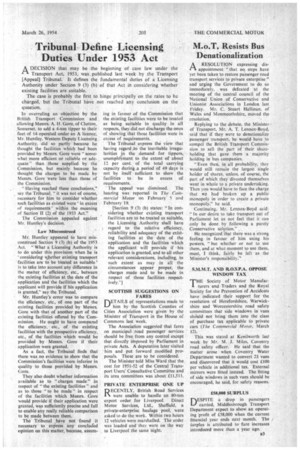Tribunal Define Licensing Duties Under 1953 Act
Page 38

If you've noticed an error in this article please click here to report it so we can fix it.
ADECISION that may be the beginning of case law under the
Transport Act, 1953, was published last week by the Transport [Appeal] Tribunal.. It defines the fundamental duties of a Licensing Authority under Section 9 (3) (b) of that Act in considering whether existing facilities are .suitable.
The case is probably the first to hinge principally on the rates to be charged, but the Tribunal have not reached any conclusion on the question.
In overruling an objection by the British Transport Commission and allowing Messrs. A. II. Gore, of Chilton, Somerset, to add a 4-ton tipper to their Beet of 14 operated under an A licence; Mr. Huntley. Western Deputy Licensing Authority, did so partly because he thought the facilities which had been provided by Messrs. Gore were "somewhat more efficient or -reliable or adequate" than those supplied by the Commission, but mainly because he thought the charges to be made by Messrs. Gore were less than those of the Commission.
" Having reached these conclusions," say the Tribunal, "it was not of coorse, necessary for him to consider whether such facilities as existed were ' in excess of requirements' within the meaning of Section 11 (2) of the 1933 Act."
The Commission appealed against Mr. Huntley's decision.
Law Misconstrued
Mr. Huntley appeared to have misconstrued Section 9 (3).(b) of the 1.953 Act. "What a Licensing Authority is to do under this provision when he is consideringwpether existing transport facilities are to be treated as suitable' is to take into account any difference in the matter of efficiency, etc., between the existing facilities at the date of the application and the facilities which the applicant will provide if his application is granted," say the Tribunal.
Mr. Huntley's error was to compare the efficiency, etc., of one part of the existing facilities provided by Messrs. Gore with that of another part of the existing facilities offered by the Commission, He ought to have compared the efficiency, etc., of the existing facilities with the prospective efficiency, etc., of the facilities which would be provided by Messrs. Gore if their application were granted.
As a fact, the Tribunal finds that there was no evidence to show that the Commission's facilities were inferior in quality to those provided by Messrs. Gore.
They also doubt whether information available as to "charges made" in respect of "the existing facilities" and as to. those "to be made" in respect of the facilities which Messrs. Gore would provide if their application were granted, was sufficiently precise and full to enable any really reliable comparison to be made between them.
The Tribunal have not found it necessary to express any concluded opinion on this matter, because, assum
ing in favour of the Commission that the existing facilities were to be treated as being suitable in quality in all respects, they did not discharge the onus of showing that those facilities were in excess of requirements.
The Tribunal express the view that having regard,to the inevitable irregularities in the demand for tippers, unempldYment to the extent of about 12 per cent, of the total carrying capacity during a period of 49 days is not by itself sufficient to show the facilities to be in excess of requirements.
The appeal was dismissed. The hearing Was reported in The Commercial Motor on February' 5 and February 19.
(Section 9 (3) (b) states: "In considering whether existing transport facilities are to betreated as suitable, she Licensing Authority shall have regard to the relative efficiency, reliability and adequacy of the existing facilities at the date of the application and the facilities which the applicant will provide if his application is granted, and to all other relevant considerations, including, to such extent as may in all the circumstances appear proper, the charges made and to be made in respect of those facilities respectively.'] SCOTTISH SUGGESTIONS ON FARES
nETAILS of representations made to
him by the Scottish Counties of Cities Association were given by the Minister of Transport in the House of Commons last week.
The Association suggested that fares on municipal road passenger services should be free from any control except that directly imposed by Parliament in private Acts. A deputation later visited him and put forward modified proposals. These are to be considered.
The Minister told Miss Ward that the cost for 1951-52 of the Central Transport Users' Consultative Committee and its area committees was about L11,511.
PRIVATE ENTERPRISE ONE UP D ECENTLY, British Road Services were unable to handle an 80-ton export order for Liverpool. Direct Motor Services, Ltd., Sheffield, a private-enterprise haulage pool, were asked to do the work. Within two hours 12 vehicles were marshalled. The order was loaded and they were on the way to Liverpool the same night.





































































































